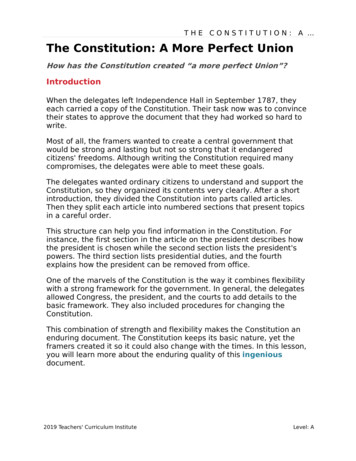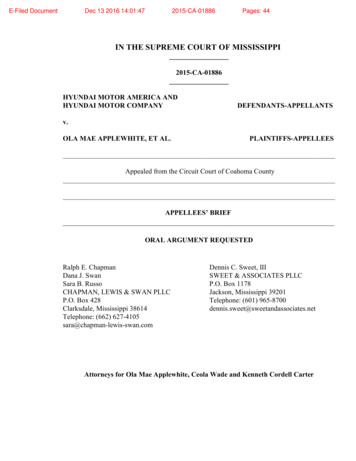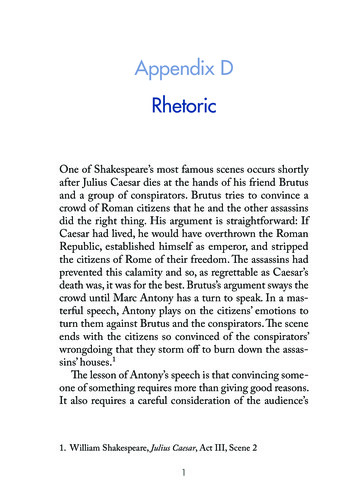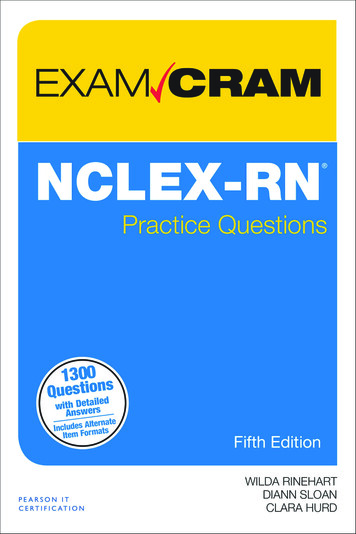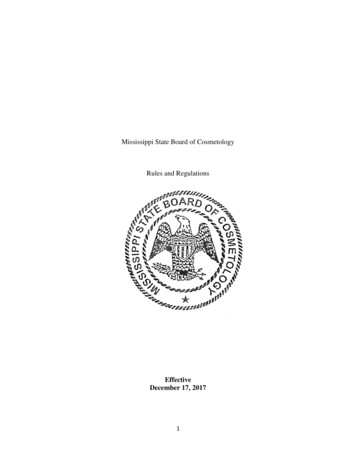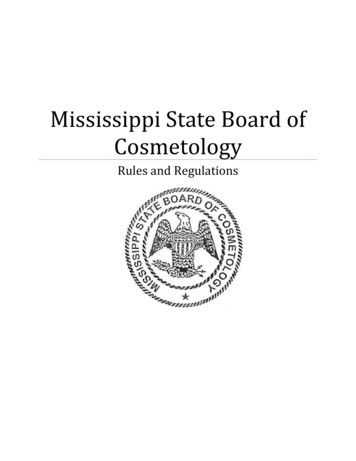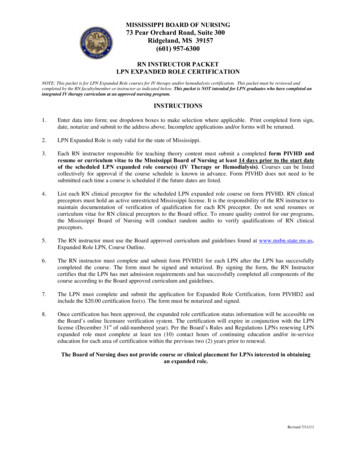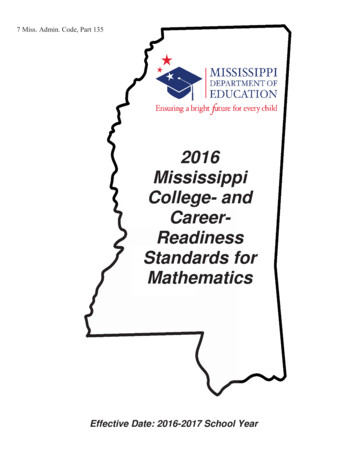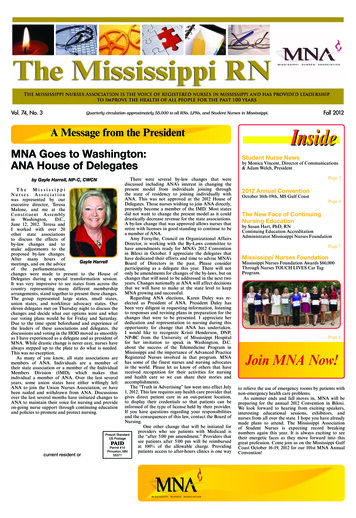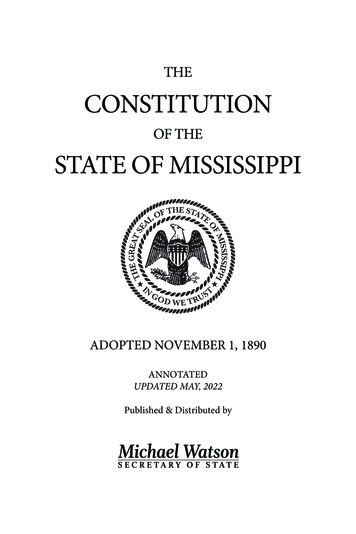
Transcription
THECONSTITUTIONOF THESTATE OF MISSISSIPPIADOPTED NOVEMBER 1, 1890ANNOTATEDUPDATED MAY, 2022Published & Distributed by
TABLE OF CONTENTSPageConstitution of the State of Mississippi. 1Preamble . 3Article 1. Distribution of Powers, Sections 1, 2 3Article 2. Boundaries of the State, Sections 3, 4 4Article 3. Bill of Rights, Sections 5 to 32. 4Article 4. Legislative DepartmentIn General, Sections 33 to 39 16Qualifications and Privileges of Legislators,Sections 40 to 53 17Rules of Procedure, Sections 54 to 77 23Injunctions, Sections 78 to 86 30Local Legislation, Sections 87 to 90 33Prohibitions, Sections 91 to 101.35Miscellaneous, Sections 102 to 115 38Article 5. Executive, Sections 116 to 143.45Article 6. Judiciary, Sections 144 to 177A 56Article 7. Corporations, Sections 178 to 200 71Article 8. Education, Sections 201 to 213B 81Article 9. Militia, Sections 214 to 222 93Article 10. The Penitentiary and Prisons,Sections 223 to 226 96Article 11. Levees, Sections 227 to 239 98Article 12. Franchise, Sections 240 to 253 103Article 13. Apportionment, Sections 254 to 256 111Article 14. General Provisions, Sections 257 to 272A.115Article 15. Amendments to the ConstitutionIn General, Section 273 123Schedule, Sections 274 to 287 129Article 16. Medical Marijuana.138Index 140
This reprint of the Constitution of the State of Mississippi is updated to include notations,changes and amendments as of May, 2022. The Constitution is printed and distributedby the Office of the Secretary of State. For a free copy of this publication, please call thePublications Division at 601-359-6344; write to P.O.Box 136, Jackson, MS 39205-0136; oremail publications@sos.ms.gov.
CONSTITUTIONOF THESTATE OF MISSISSIPPIADOPTED NOVEMBER 1, 1890Beginning SectionARTICLE 1.DISTRIBUTION OF POWERS 1ARTICLE 2.BOUNDARIES OF THE STATE 3ARTICLE 3.BILL OF RIGHTS. 5ARTICLE 4.LEGISLATIVE DEPARTMENT.33ARTICLE 5.EXECUTIVE.116ARTICLE 6.JUDICIARY 144ARTICLE 7.CORPORATIONS 178ARTICLE 8.EDUCATION.201ARTICLE 9.MILITIA.214ARTICLE 10. THE PENITENTIARY AND PRISONS.223ARTICLE 11. LEVEES.227ARTICLE 12. FRANCHISE 240ARTICLE 13. APPORTIONMENT 254ARTICLE 14. GENERAL PROVISIONS 257ARTICLE 15. AMENDMENTS TO THE CONSTITUTION.273ARTICLE 16.MEDICAL MARIJUANA.288.11
MISSISSIPPI CONSTITUTION2
CONSTITUTIONOF THE STATE OF MISSISSIPPIADOPTED NOVEMBER 1, A.D., 1890PREAMBLEWe, the people of Mississippi in convention assembled, grateful toAlmighty God, and invoking his blessing on our work, do ordain andestablish this constitution.ARTICLE 1DISTRIBUTION OF POWERSSECTION 1. Powers of government.SECTION 2. Encroachment of power.SECTION 1.Powers of government.The powers of the government of the State of Mississippi shall be dividedinto three distinct departments, and each of them confided to a separatemagistracy, to-wit: those which are legislative to one, those which arejudicial to another, and those which are executive to another.SOURCES: 1817 art II § 1; 1832 art II § 1; 1869 art III § 1.SECTION 2.Encroachment of power.No person or collection of persons, being one or belonging to one ofthese departments, shall exercise any power properly belonging to eitherof the others. The acceptance of an office in either of said departmentsshall, of itself, and at once, vacate any and all offices held by the person soaccepting in either of the other departments.SOURCES: 1817 art II § 2; 1832 art II § 2; 1869 art III § 1.3
MISSISSIPPI CONSTITUTIONART. 2, SEC. 3ARTICLE 2BOUNDARIES OF THE STATESECTION 3.SECTION 4.SECTION 3.Repealed.Acquisition of territory; disputed boundaries.Repealed.Repealed by Laws, 1990, ch. 692, eff December 19, 1990. [Preamble,Const. 1817]NOTE: Former SECTION 3 stated the limits and boundaries of the stateof Mississippi.The repeal of Section 3 of Article 2 of the Mississippi Constitution of 1890was proposed by Laws, 1990, ch. 692 (Senate Concurrent Resolution No.520), and upon ratification by the electorate on November 6, 1990, wasdeleted from the Constitution by proclamation of the Secretary of State onDecember 19, 1990.SECTION 4.Acquisition of territory; disputedboundaries.The Legislature shall have power to consent to the acquisition ofadditional territory by the state, and to make the same a part thereof; andthe Legislature may settle disputed boundaries between this state and itscoterminus states whenever such disputes arise.ARTICLE 3BILL OF RIGHTSSECTION 5.Government originating in the people.SECTION 6.Regulation of government; right to alter.SECTION 7.Secession prohibited.SECTION 8.Citizens of state.SECTION 9.Subordination of military to civil power.SECTION 10.Treason.SECTION 11.Peaceful assemblage; right to petitiongovernment.4
BILL OF RIGHTSART. 3, SEC. 5SECTION 12.Right to bear arms.SECTION 12A.Right to hunt, fish, and harvest wildlife.SECTION 13.Freedom of speech and press; libel.SECTION 14.Due process.SECTION 15.Slavery and involuntary servitude prohibited;punishment for crime.SECTION 16.Ex post facto laws; impairment of contract.SECTION 17.Taking property for public use; duecompensation.SECTION 17A.Taking private property by eminent domain;transfer to others prohibited for ten years;exceptions.SECTION 18.Freedom of religion.SECTION 19.Repealed.SECTION 20.Specific term of office.SECTION 21.Writ of habeas corpus.SECTION 22.Double jeopardy.SECTION 23.Searches and seizures.SECTION 24.Open courts; remedy for injury.SECTION 25.Access to courts.SECTION 26.Rights of accused; state grand juryproceedings.SECTION 26A.Victims’ rights; construction of provisions;legislative authority.SECTION 27.Proceeding by indictment or information.SECTION 28.Cruel or unusual punishment prohibited.SECTION 29.Excessive bail prohibited; revocation or denialof bail.SECTION 30.Imprisonment for debt.SECTION 31.Trial by jury.SECTION 32.Construction of enumerated rights.SECTION 5.Government originating in the people.All political power is vested in, and derived from, the people; allgovernment of right originates with the people, is founded upon their willonly, and is instituted solely for the good of the whole.SOURCES: 1817 art I § 2; 1832 art I § 2.5
MISSISSIPPI CONSTITUTIONART. 3, SEC. 6SECTION 6.Regulation of government; right to alter.The people of this state have the inherent, sole, and exclusive right toregulate the internal government and police thereof, and to alter andabolish their constitution and form of government whenever they deemit necessary to their safety and happiness; Provided, Such change be notrepugnant to the constitution of the United States.SOURCES: 1817 art I § 2; 1832 art I § 2.SECTION 7.Secession prohibited.The right to withdraw from the Federal Union on account of any real orsupposed grievance, shall never be assumed by this state, nor shall any lawbe passed in derogation of the paramount allegiance of the citizens of thisstate to the government of the United States.SOURCES: 1869 art I § 20.SECTION 8.Citizens of state.All persons, resident in this State, citizens of the United States, are herebydeclared citizens of the State of Mississippi.SOURCES: 1869 art I § 1.SECTION 9.Subordination of military to civil power.The military shall be in strict subordination to the civil power.SOURCES: 1869 art I § 25.SECTION 10.Treason.Treason against the state shall consist only in levying war against thesame or in adhering to its enemies, giving them aid and comfort. Noperson shall be convicted of treason unless on the testimony of twowitnesses to the same overt act, or on confession in open court.SOURCES: 1817 art VI § 3; 1832 art VII § 3; 1869 art I § 26.6
BILL OF RIGHTSART. 3, SEC. 12ASECTION 11.Peaceful assemblage; right to petitiongovernment.The right of the people peaceably to assemble and petition thegovernment on any subject shall never be impaired.SOURCES: 1817 art I, § 22; 1832 art I, § 22; 1869 art I, § 6.SECTION 12.Right to bear arms.The right of every citizen to keep and bear arms in defense of his home,person, or property, or in aid of the civil power when thereto legallysummoned, shall not be called in question, but the Legislature mayregulate or forbid carrying concealed weapons.SOURCES: 1817 art I § 23; 1832 art I § 23; 1869 art I § 15.SECTION 12A.Right to hunt, fish, and harvest wildlife.The people have the right to hunt, fish and harvest wildlife, including bythe use of traditional methods, subject only to laws and regulations thatpromote wildlife conservation and management and that preserve thefuture of hunting and fishing, as the Legislature may prescribe by generallaw. Public hunting and fishing shall be a preferred means of managingand controlling wildlife. This section may not be construed to modify anyprovision of law relating to trespass, property rights, the regulation ofcommercial activities or the maintenance of levees pursuant to Article 11.SOURCES: Laws, 2012, Ch.2024NOTE: The insertion of Section 12A in Article 3 of the Constitution wasproposed by Chapter 2024, Laws of 2012 (House Concurrent ResolutionNo. 30), and upon ratification by the electorate on November 4, 2014, wasinserted as a part of the Constitution by proclamation of the Secretary ofState on December 2, 2014.The last paragraph of HCR 30 provides as follows:“BE IT FURTHER RESOLVED, That the Attorney General of the State ofMississippi shall submit this resolution, immediately upon adoption by theLegislature of the State of Mississippi, to the Attorney General of the UnitedStates or to the United States District Court for the District of Columbia in7
ART. 3, SEC. 12AMISSISSIPPI CONSTITUTIONaccordance with the provisions of the Voting Rights Act of 1965, as amendedand extended.”However, after the bill was approved, the United States Supreme Court, inthe case of Shelby County v. Holder (June 25, 2013), struck down the coverageformula that determined what jurisdictions are subject to Section 5 of theVoting Rights Act, so the coverage formula can no longer be used as a basisfor subjecting jurisdictions to preclearance under Section 5.Because of the Shelby County decision, the United States AttorneyGeneral is not making any determinations under Section 5 on voting orelection changes made by states. The Supreme Court did not strike downSection 5, so it is still in effect. For that reason, the Mississippi AttorneyGeneral’s Office submitted House Concurrent Resolution 30 (2012) to theUnited States Attorney General in order to technically meet the requirementsof Section 5 and fulfill the Legislative direction in the final paragraph of theResolution.By letter dated March 6, 2014, the United States Attorney Generalresponded that he is not making determinations on the merits of any billthat is submitted under Section 5. The submission of HCR 30 (2012) and theresponse from the United States Attorney General technically met therequirements of Section 5 and fulfilled the Legislative direction in the finalparagraph of the Resolution.SECTION 13.Freedom of speech and press; libel.The freedom of speech and of the press shall be held sacred; and in allprosecutions for libel the truth may be given in evidence, and the jury shalldetermine the law and the facts under the direction of the court; and if itshall appear to the jury that the matter charged as libelous is true, and waspublished with good motives and for justifiable ends, the party shall beacquitted.SOURCES: 1817 art I §§ 6, 7 and 8; 1832 art I §§ 6, 7 and 8; 1869 art I § 4.SECTION 14.Due process.No person shall be deprived of life, liberty, or property except by dueprocess of law.SOURCES: 1817 art I § 10; 1832 art I § 10; 1869 art I § 2.8
BILL OF RIGHTSSECTION 15.ART. 3, SEC. 17ASlavery and involuntary servitudeprohibited; punishment for crime.There shall be neither slavery nor involuntary servitude in this state,otherwise than in the punishment of crime, whereof the party shall havebeen duly convicted.SOURCES: 1869 art I § 19.SECTION 16.Ex post facto laws; impairment of contract.Ex post facto laws, or laws impairing the obligation of contracts, shall notbe passed.SOURCES: 1817 art I § 19; 1832 art I § 19; 1869 art I § 9.SECTION 17.Taking property for public use; duecompensation.Private property shall not be taken or damaged for public use, excepton due compensation being first made to the owner or owners thereof, ina manner to be prescribed by law; and whenever an attempt is made totake private property for a use alleged to be public, the question whetherthe contemplated use be public shall be a judicial question, and, as such,determined without regard to legislative assertion that the use is public.SOURCES: 1817 art I § 13; 1832 art I § 13; 1869 art I § 10.SECTION 17A.Taking private property by eminentdomain; transfer to others prohibited forten (10) years; exceptions.No property acquired by the exercise of the power of eminent domainunder the laws of the State of Mississippi shall, for a period of ten yearsafter its acquisition, be transferred or any interest therein transferred to anyperson, non-governmental entity, public-private partnership, corporation,or other business entity with the following exceptions:(1) The above provisions shall not apply to drainage and levee facilitiesand usage, roads and bridges for public conveyance, flood control projectswith a levee component, seawalls, dams, toll roads, public airports, publicports, public harbors, public wayports, common carriers or facilities for9
ART. 3, SEC. 17AMISSISSIPPI CONSTITUTIONpublic utilities and other entities used in the generation, transmission,storage or distribution of telephone, telecommunication, gas carbondioxide, electricity, water, sewer, natural gas, liquid hydrocarbons or otherutility products.(2) The above provisions shall not apply where the use of eminentdomain (a) removes a public nuisance; (b) removes a structure that isbeyond repair or unfit for human habitation or use; (c) is used to acquireabandoned property; or (d) eliminates a direct threat to public health orsafety caused by the property in its current condition.SOURCES: Executive Order No. 1074, 2012, eff. January 9, 2012.NOTE: During the November 8, 2011, General Election, a citizen-initiated Constitutional amendment, Initiative # 31 - Eminent Domain,was approved by a majority of the electors of Mississippi. The Governor, byExecutive Order No. 1074, dated January 9, 2012, directed the Secretary ofState to insert Initiative # 31 into the Mississippi Constitution as Article 3,§ 17A. Article 15, § 273(10) of the Mississippi Constitution provides thatinitiatives approved by the electors take effect thirty (30) days from the dateof the official declaration of the vote by the Secretary of State. The Secretaryof State certified the November 8, 2011, election on December 8, 2011.SECTION 18.Freedom of religion.No religious test as a qualification for office shall be required; and nopreference shall be given by law to any religious sect or mode of worship;but the free enjoyment of all religious sentiments and the different modesof worship shall be held sacred. The rights hereby secured shall not beconstrued to justify acts of licentiousness injurious to morals or dangerousto the peace and safety of the state, or to exclude the Holy Bible from use inany public school of this state.SOURCES: 1817 art I §§ 3, 4; 1832 art I §§ 3, 4; 1869 art I § 23.SECTION 19.Repealed.Repealed by Laws, 1977, ch. 584, eff December 22, 1978. [1817 art VI §2; 1832 art VII § 2; 1869 art I § 27]NOTE: Former Section 19 prohibited dueling and both disenfranchisedand disqualified persons involved in a duel from holding public office.The repeal of Section 19 of Article 3 of the Constitution of 1890 was10
BILL OF RIGHTSART. 3, SEC. 23proposed by Laws, 1977, ch. 584 (Senate Concurrent Resolution No. 528)and upon ratification by the electorate on November 7, 1978, was deletedfrom the Constitution by proclamation of the Secretary of State on December22, 1978.SECTION 20.Specific term of office.No person shall be elected or appointed to office in this state for lifeor during good behavior, but the term of all officers shall be for somespecified period.SOURCES: 1817 art VI § 12; 1832 art I § 30; 1869 art I § 29.SECTION 21.Writ of habeas corpus.The privilege of the writ of habeas corpus shall not be suspended, unlesswhen in the case of rebellion or invasion, the public safety may require it,nor ever without the authority of the legislature.SOURCES: 1817 art I § 13; 1832 art I § 13; 1869 art I § 5.SECTION 22.Double jeopardy.No person’s life or liberty shall be twice placed in jeopardy for the sameoffense; but there must be an actual acquittal or conviction on the merits tobar another prosecution.SOURCES: 1817 art I § 13; 1832 art I § 13; 1869 art I § 5.SECTION 23.Searches and seizures.The people shall be secure in their persons, houses, and possessions,from unreasonable seizure or search; and no warrant shall be issuedwithout probable cause, supported by oath or affirmation, speciallydesignating the place to be searched and the person or thing to be seized.SOURCES: 1817 art I § 9; 1832 art I § 9; 1869 art I § 14.11
MISSISSIPPI CONSTITUTIONART. 3, SEC. 24SECTION 24.Open courts; remedy for injury.All courts shall be open; and every person for an injury done him in hislands, goods, person, or reputation, shall have remedy by due course of law,and right and justice shall be administered without sale, denial, or delay.SOURCES: 1817 art I § 14; 1832 art I § 14; 1869 art I § 28.SECTION 25.Access to courts.No person shall be debarred from prosecuting or defending any civilcause for or against him or herself, before any tribunal in the state, by himor herself, or counsel, or both.SOURCES: 1817 art I § 29; 1832 art I § 29; 1869 art I § 30.SECTION 26.Rights of accused; state grand juryproceedings.In all criminal prosecutions the accused shall have a right to be heardby himself or counsel, or both, to demand the nature and cause of theaccusation, to be confronted by the witnesses against him, to havecompulsory process for obtaining witnesses in his favor, and, in allprosecutions by indictment or information, a speedy and public trial byan impartial jury of the county where the offense was committed; and heshall not be compelled to give evidence against himself; but in prosecutionsfor rape, adultery, fornication, sodomy or crime against nature the courtmay, in its discretion, exclude from the courtroom all persons except suchas are necessary in the conduct of the trial. Notwithstanding any otherprovisions of this Constitution, the Legislature may enact laws establishinga state grand jury with the authority to return indictments regardless of thecounty where the crime was committed. The subject matter jurisdictionof a state grand jury is limited to criminal violations of the MississippiUniform Controlled Substances Law or any other crime involvingnarcotics, dangerous drugs or controlled substances, or any crime arisingout of or in connection with a violation of the Mississippi UniformControlled Substances Law or a crime involving narcotics, dangerous drugsor controlled substances if the crime occurs within more than one (1)circuit court district of the state or transpires or has significance in morethan one (1) circuit court district of the state. The venue for the trial ofindictments returned by a state grand jury shall be as prescribed by generallaw.12
BILL OF RIGHTSART. 3, SEC. 27SOURCES: 1817 art I § 10; 1832 art I § 7; Laws, 1994, ch. 668, effDecember 9, 1994.NOTE: The 1994 amendment of Section 26, Mississippi Constitution of1890, proposed by Laws, 1994, ch. 668 (House Concurrent Resolution No.79), was approved by the House of Representatives on March 29, 1994,and by the Senate on March 30, 1994. It was ratified by the electorate onNovember 8, 1994, and inserted as part of the Constitution by proclamationof the Secretary of State on December 9, 1994.SECTION 26A. Victims’ rights; construction of provisions;legislative authority.(1) Victims of crime, as defined by law, shall have the right to be treatedwith fairness, dignity and respect throughout the criminal justice process;and to be informed, to be present and to be heard, when authorized by law,during public hearings.(2) Nothing in this section shall provide grounds for the accused orconvicted offender to obtain any form of relief nor shall this sectionimpair the constitutional rights of the accused. Nothing in this section orany enabling statute shall be construed as creating a cause of action fordamages against the state or any of its agencies, officials, employees orpolitical subdivisions.(3) The Legislature shall have the authority to enact substantive andprocedural laws to define, implement, preserve and protect the rightsguaranteed to victims by this section.SOURCES: Laws, 1998, ch. 691, eff November 30, 1998.SECTION 27.Proceeding by indictment or information.No person shall, for any indictable offense, be proceeded againstcriminally by information, except in cases arising in the land or navalforces, or the military when in actual service, or by leave of the courtfor misdemeanor in office or where a defendant represented by counselby sworn statement waives indictment; but the legislature, in cases notpunishable by death or by imprisonment in the penitentiary, may dispensewith the inquest of the grand jury, and may authorize prosecutions beforejustice court judges, or such other inferior court or courts as may beestablished, and the proceedings in such cases shall be regulated by law.13
ART. 3, SEC. 27MISSISSIPPI CONSTITUTIONSOURCES: 1817 art I § 12; 1832 art I § 12; 1869 art I § 31; Laws, 1977, ch.590, eff December 22, 1978.NOTE: The 1977 amendment to Section 27 of Article 3 of the Constitutionof 1890 was proposed by Laws, 1977, ch. 590, (Senate Concurrent ResolutionNo. 590 of the 1977 regular session of the Legislature), and upon ratificationby the electorate on November 7, 1978, was inserted by proclamation of theSecretary of State on December 22, 1978.SECTION 28.Cruel or unusual punishment prohibited.Cruel or unusual punishment shall not be inflicted, nor excessive fines beimposed.SOURCES: 1817 art I § 16; 1832 art I § 16; 1869 art I § 8.SECTION 29.Excessive bail prohibited; revocation ordenial of bail.(1) Excessive bail shall not be required, and all persons shall, beforeconviction, be bailable by sufficient sureties, except for capital offenses (a)when the proof is evident or presumption great; or (b) when the personhas previously been convicted of a capital offense or any other offensepunishable by imprisonment for a maximum of twenty (20) years or more.(2) If a person charged with committing any offense that is punishableby death, life imprisonment or imprisonment for one (1) year or morein the penitentiary or any other state correctional facility is granted bailand (a) if that person is indicted for a felony committed while on bail; or(b) if the court, upon hearing, finds probable cause that the person hascommitted a felony while on bail, then the court shall revoke bail and shallorder that the person be detained, without further bail, pending trial ofthe charge for which bail was revoked. For the purposes of this subsection(2) only, the term “felony” means any offense punishable by death, lifeimprisonment or imprisonment for more than five (5) years under the lawsof the jurisdiction in which the crime is committed. In addition, grandlarceny shall be considered a felony for the purposes of this subsection.(3) In the case of offenses punishable by imprisonment for a maximumof twenty (20) years or more or by life imprisonment, a county or circuitcourt judge may deny bail for such offenses when the proof is evident or14
BILL OF RIGHTSART. 3, SEC. 31the presumption great upon making a determination that the release ofthe person or persons arrested for such offense would constitute a specialdanger to any other person or to the community or that no condition orcombination of conditions will reasonably assure the appearance of theperson as required.(4) In any case where bail is denied before conviction, the judge shallplace in the record his reasons for denying bail. Any person who is chargedwith an offense punishable by imprisonment for a maximum of twenty(20) years or more or by life imprisonment and who is denied bail prior toconviction shall be entitled to an emergency hearing before a justice of theMississippi Supreme Court. The provisions of this subsection (4) do notapply to bail revocation orders.SOURCES: 1817 art I § 16; 1832 art I § 16; 1869 art I § 8; Laws, 1987, ch.674; Laws, 1995, ch. 636, eff December 5, 1995.NOTE: The 1987 amendment of Section 29 in Article 3 of the MississippiConstitution of 1890 was proposed by Laws, 1987, ch. 674 (SenateConcurrent Resolution No. 534), and upon ratification by the electorate onNovember 3, 1987, was inserted as part of the Constitution by proclamationof the Secretary of State on December 4, 1987.The 1995 amendment of Section 29 in Article 3 of the MississippiConstitution of 1890 was proposed by Laws, 1995, ch. 636 (HouseConcurrent Resolution No. 42), and upon ratification by the electorateon November 7, 1995, was inserted as a part of the Constitution byproclamation of the Secretary of State on December 5, 1995.SECTION 30.Imprisonment for debt.There shall be no imprisonment for debt.SOURCES: 1817 art I § 18; 1832 art I § 18; 1869 art I § 11.SECTION 31.Trial by jury.The right of trial by jury shall remain inviolate, but the Legislature may,by enactment, provide that in all civil suits tried in the circuit and chancerycourt, nine or more jurors may agree on the verdict and return it as theverdict of the jury.SOURCES: 1817 art I § 28; 1832 art I § 28; 1869 art I § 12; Laws, 1916, ch.158.15
MISSISSIPPI CONSTITUTIONART. 3, SEC. 32SECTION 32.Construction of enumerated rights.The enumeration of rights in this constitution shall not be construed todeny and impair others retained by, and inherent in, the people.SOURCES: 1817 art I; 1832 art I; 1869 art I § 32.ARTICLE 4LEGISLATIVE DEPARTMENTSECTION 33.SECTION 34.SECTION 35.SECTION 36.SECTION 37.SECTION 38.SECTION 39.Composition of Legislature.Composition of House of Representatives.Composition of Senate.Sessions.Elections for members.Election of officers by each house.President pro tempore of Senate.SECTION 33.Composition of Legislature.The legislative power of this state shall be vested in a Legislature whichshall consist of a Senate and a House of Representatives.SOURCES: 1817 art III § 4; 1832 art III § 4; 1869 art IV § 1.SECTION 34.Composition of House of Representatives.The House of Representatives shall consist of members chosen every fouryears by the qualified electors of the several counties and Representativedistricts.SOURCES: 1869 art IV § 2.SECTION 35.Composition of Senate.The Senate shall consist of members chosen every four years by thequalified electors of the several districts.SOURCES: 1869 art IV § 4.16
LEGISLATIVESECTION 36.ART. 4, SEC. 39Sessions.The Legislature shall meet at the seat of government in regular session onthe Tuesday after the first Monday of January of the year A.D., 1970, andannually thereafter, unless sooner convened by the Governor; provided,however, that such sessions shall be limited to a period of one hundredtwenty-five (125) calendar days for regular 1972 session and every fourthyear thereafter, but ninety (90) calendar days for every other regularsession thereafter. Provided further that the House of Representatives, byresolution with
ART. 1. The powers of the government of the State of Mississippi. shall be . divided into three distinct departments, and each of them confided . to a separate magistracy, to-wit: those which are legislative to one, those which are judicial to another, and those which are executive to . another. SOURCES: 1817 art II § 1; 1832. art II § 1 .



